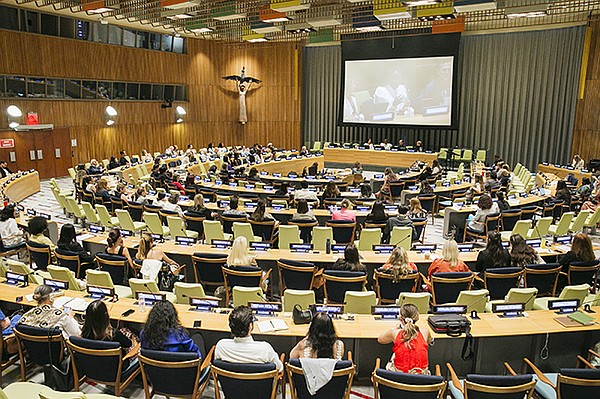The United Nations Conscious Fashion and Lifestyle Network, with the United Nations Office for Partnerships and the Fashion Impact Fund, brought together eco-fashion experts, suppliers, brands and industry shareholders to examine the direction of sustainable efforts. Ryosuke.N
SUSTAINABILITY
U.N. Conscious Fashion and Lifestyle Network Annual Meeting Addresses Industry’s Challenges
Sustainable-fashion experts, brand leaders and sourcing professionals discussed the progress of Sustainable Development Goals and challenges during the United Nations Conscious Fashion and Lifestyle Network annual meeting with the United Nations Office for Partnerships and the Fashion Impact Fund. This meeting was held as the network achieved 54 percent growth during the year, with the highest country engagement reported from the United States, U.K., India, France, Germany, Italy, Kenya and Brazil, according to Kerry Bannigan, executive director of the Fashion Impact Fund.
“The meeting emphasized the significance of collaboration and partnership building,” said Bannigan. “Globally, we are faced with urgent and complex challenges. Climate change is ravaging our planet, poverty continues to afflict millions of people worldwide, and gender inequality persists in every corner of the world. We cannot ignore the implications of the fashion and lifestyle sectors on our planet and its people.”
The meeting was hosted at U.N. headquarters in New York and supported by the organization’s partners—fiber producers Lenzing and The LYCRA Company and textile recycler Renewcell. Calik Denim was present during the meeting as the network’s supporting partner representing the denim industry.
“Their involvement significantly enhances the network’s ability to address sustainability challenges specific to the denim sector to foster positive change throughout the denim supply chain,” Bannigan said. “As a prominent player in the denim supply chain, Calik Denim’s commitments can have a ripple effect on the entire industry.”
Calik’s support of the United Nations Conscious Fashion and Lifestyle Network is an important component of the supplier’s commitment to sustainability. During the June 1 meeting, the denim manufacturer’s Senior Marketing and Communications Executive Selen Baltaci revealed the ways in which the company is conducting business more sustainably.
“We have been carrying out R&D research for many years focusing on biodiversity. It’s one of the most important things for the future of our planet, and we have started to invest in regenerative farming,” Baltaci said. “With the Autumn/Winter 2024–25 collection, we have included regenerative articles. Ten percent of the contracted farmers that we are working with started to produce regenerative cotton for us.”
Advancing eco initiatives
While many fashion professionals have expressed interest in building a sustainable future and apparel companies often share messaging that relays intentions to align with ecological commitments, these proclamations have yet to be fully channeled into actionable steps to move the industry far forward since the 2015 Paris Agreement. Most panelists during the discussions agreed that there is an urgent need for the apparel industry to take large steps with farm-to-sales efforts to heal the planet.
“Climate education means understanding the impact of climate through the apparel industry from the entire value cycle, starting at the raw material–extraction stage where we’re interacting with cotton farmers and helping them to understand or facilitating them with things like regenerative agriculture, illuminating the impact of fertilizers and pesticides,” explained Samata Pattinson, CEO of RCGD Global. “That goes all the way from designers and manufacturers to storefronts.”
In order to slow the negative effects of climate change, fashion-industry stakeholders were urged to recognize the value in creating a transparent and inclusive industry by transforming their businesses.
“Companies are not investing in [sustainable efforts] because there’s no profit motive,” said Ngozi Okaro, executive director for Custom Collaborative. “The inputs are low costs of labor—which are Black and brown women, cheap fibers and no costs for pollution. There is no extended producer responsibility. There are limited human rights in some of the places where the clothes are made.”
When discussing the relationship between how executive leaders conduct business and the limited movement of ecological initiatives within the apparel industry, Okaro noted that their vision is often shortsighted.
“If CEOs who are looking at two or three years down the road so they can get their bonuses and leave, it doesn’t make sense for them to invest in sustainability or better practices,” Okaro explained.
This sentiment of embracing long-term commitments was also shared by Tricia Carey, chief commercial officer at Renewcell, who explained that suppliers must minimize risk for retailers and brands.
“There has to be the understanding that it’s not all going to be perfect out of the gate,” said Carey. “We need to work with more suppliers as well as retailers and brands who are willing to look long term at how we can collaborate together. It’s getting out of this short-term mentality. Let’s all face it. We’re not in a very good retail situation right now. Orders are down, raw-material prices are down, so it’s very challenging to try to bring this additional value into apparel.”






















